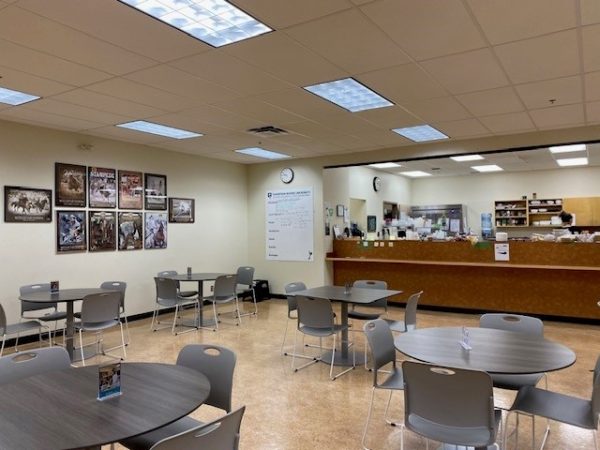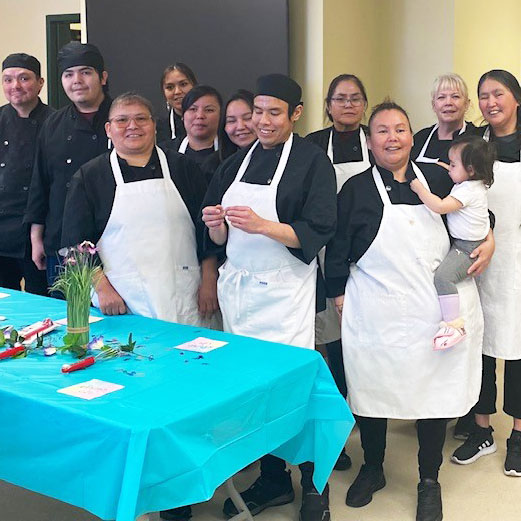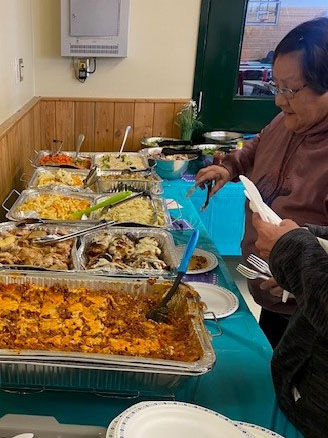
Cook training students provide food for TRU’s on-campus cafeteria in Williams Lake.
By Kim Van Haren
Food brings people together, builds communities and celebrates cultural diversity. And for students of the four-week Basic Cook Skills Training program at Thompson Rivers University’s (TRU) Williams Lake (WL) campus, it’s also a path to a diverse and rewarding career.
“Students in the program work in the cafeteria and learn how to make the basics — soups, salads and sandwiches,” says Alison Sutherland-Mann, Red Seal Chef and community education and workforce development co-ordinator at the Williams Lake campus.
“They also do some catering and learn about menus and how to build them. Students get used to being in a busy kitchen, dealing with co-workers and learn about safety and sanitation practices, while working with a chef who provides guidance and direction. After four weeks, students go on a ‘stage’ and work with employers to apply what they’ve learned.”

TRU Williams Lake Community Co-ordinator Alison Sutherland-Mann (back row, second from right) with Ulkatcho students.
Meeting the need
After receiving her Red Seal certification from Northern Lights College in Dawson Creek in 2008, Sutherland-Mann, with support from the administration at TRU WL, held a camp cook training program out of her restaurant in Williams Lake. The hands-on program continued to run through the university’s continuing studies program for several years. Sutherland-Mann joined TRU as a community co-ordinator in 2018.
“When I started at TRU, I knew there was a huge need for line cooks in the food industry,” she says. “So, I reworked the camp cook program to line cook and that’s what we offered students.”
“To train a line cook, you train them to go into different settings. It’s busy, noisy and a lot of stuff is going on, so I try and take the stigma out of it. And we train students over weeks, so they can get interested, involved, engaged and transition into the workforce.”
The 10 students who completed training in 2019 immediately found work after the program.
And then COVID hit, allowing time for Sutherland-Mann to make some changes.
“When we came back from COVID, I decided to change the focus from camp cook, or line cook, to a basic cook skills training program, where we’d also include catering and institutional cooking like we see in seniors’ residences and in hospitals, to name a few.”
The Basic Cook Skills Training program welcomed students in the fall of 2022, the winter of 2023 and most recently this fall, on October 30.
“Students who complete the program haven’t had issues finding work,” adds Sutherland-Mann. “Employers are looking for cooks right now.”

Ulkatcho community members enjoy student-made dishes.
Indigenous student success
Earlier this year, the Ulkatcho First Nation reached out to Sutherland-Mann to say they were interested in offering basic cook skills training and asked if she would like to spend time teaching in their community.
The Red Seal Chef believes it was a clear sign to take things on the road.
“The Coastal GasLink pipeline is going in between Anahim Lake and Vanderhoof, and Aramark, a large food service provider, is running their camps. So, they basically said, ‘If you have trained people, we’ll hire them.’”
Sutherland-Mann trained 10 Indigenous students over six weeks.
“It was the best time,” she says, smiling.
“Everyone was amazing. Every Tuesday, we’d feed about 150 people. We fed the Elders, residential school survivors, a good part of the band, including the band office and nurses. And with that training a few students were hired in the cooking camps, and some stayed in community to feed the Elders and do catering out of the community hall,” she continues.
“Sixty to 80 per cent of the students in the cook training program in Williams Lake are Indigenous, and a lot of the bands now are wanting the training and to have it delivered out in community.”
Sutherland-Mann says she’s retooled the program once again since returning from Anahim Lake.
“After teaching it out in community, I wanted to make it a little less culinary school based, and more feet-on-the-ground based. Because if you want the full culinary experience, it’s a great idea to go to culinary school. We can’t do it here in such a short time.”
Sutherland-Mann plans to take the program back on the road in early 2024.
“What I’m hoping is that I can train cooks within the community and have them take charge of the kitchen and train others,” she says. “And that way they can keep the culinary skills moving forward. That’s the ultimate goal.”

